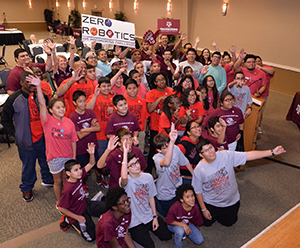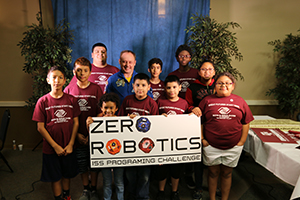The Zero Robotics Middle School Summer Program held its final competition on board the International Space Station (ISS) with Texas teams meeting at the Johnson Space Center in Houston on Aug. 12. Zero Robotics (ZR) is a computer programming competition for middle school students where they develop programs to control SPHERES (Synchronized Position Hold Engage Reorient Experimental Satellites) inside the ISS.

The ZR Middle School Program is a five-week summer program with curriculum designed to cultivate interest in science, technology, engineering and mathematics (STEM).
To compete, a team must be comprised of eight to 20 middle school students along with a primary mentor. This year, seven teams from Texas participated in the competition: Bach Springs Middle School, Boys and Girls Club of Edinburg Rio Grande Valley (RGV), Boys and Girls Club of McAllen, The Mighty Tacos from Fort Bliss, Indian Spring Middle School, JBSA Lackland Youth Program and YMCA of Greater San Antonio.
The students created, edited, shared, saved, simulated and submitted programming code in order to accomplish a given task. After several rounds of competition within the class and then within the region, the Boys and Girls Club of Edinburg RGV was selected to compete against other teams across the nation in the final championship. An astronaut aboard the ISS used the teams’ codes to conduct the championship competition in microgravity with a live broadcast.

This year’s competition was SpySPHERES. According to the final rules and game guide provided by MIT, matches were played between two SPHERES satellites, one controlled by code written by the team, and enemy SPHERES developed at MIT. The objective of the game was to use the robotic satellite to collect data from a defunct satellite and spy on the opponents’ satellite. Players had to take into account fuel and energy consumption when planning their code. The winner of the round was the SPHERES that received the most points from taking the best and most pictures while avoiding pictures being taken of it.
“My favorite part of the competition was when something would happen that would make us all laugh – sometimes it would mean more work for us, but it was also more fun for us,” said Joaquin Rodriguez, a member of the Boys and Girls Club of Edinburg RGV team.
Zero Robotics seeks to inspire the next generation of great minds by allowing them unprecedented access to space at the high school and middle school level. By making the benefits and resources of the space program tangible to students, Zero Robotics aims to cultivate an appreciation of science, technology, engineering and math through healthy, immersive, collaborative competition.
“I really liked writing programs for the International Space Station, it was really fun,” said Ghya Salinas, a sixth-grader on the Boys and Girls Club of Edinburg RGV team. Salinas wants to be a doctor or scientist someday.
Dr. Greg Chamitoff and Dr. David Hyland, from the Department of Aerospace Engineering at Texas A&M University, were co-directors of the statewide program and Katharine Leysath, from the PK-12 Engineering Education Outreach office, was the statewide program manager. Aerospace engineering students from Texas A&M who served as mentors for the Texas teams included Mauricio Coen, Vinicuis Goecks, Brandon Allred, Kimberly Barraza and Kaycee Dillon.
Texas A&M’s PK-12 Engineering Education Outreach, the ASTRO Center from the Department of Aerospace Engineering and the Texas Partners for Out of School Time were the statewide sponsors for this third year of participation in the state of Texas. Supporting sponsors from the state included the Texas Space Grant Consortium and Fluor Corporation. National sponsors included Massachusetts Institute of Technology, MIT Space Systems Laboratory, Aurora Flight Sciences, and Innovation Learning Center. National supporting sponsors included Northrop Grumman Foundation, the Center for Advancement of Science in Space, the European Space Agency, and NASA.
Applications for the 2016 Zero Robotics High School Tournament are now open. To learn more about this international programming competition aboard the ISS for ninth through 12th grades, visit http://astrocenter.tamu.edu/zerorobotics/.